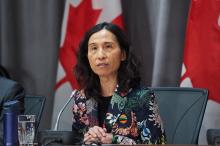CEOs did not cause the pandemic. But they deserve a good deal of the blame for a model that shoveled profits up the corporate ladder, leaving lower-level employees financially insecure. When Covid-19 struck, it didn’t take much to push millions of vulnerable workers over the edge.
Last month, Mark Machin, CEO of the Canada Pension Plan (CPP), wrote that climate change is the crisis beyond COVID-19 that we can’t afford to ignore, stating that “the full effects will depend on the actions we take now and in the future.”
We strongly agree.








